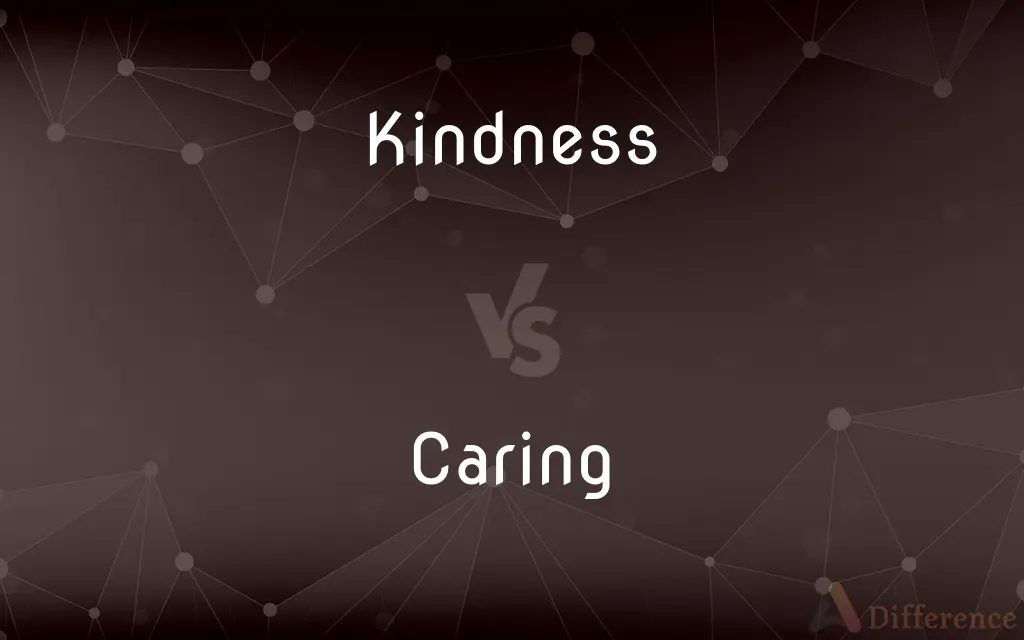Kindness vs. Caring — What's the Difference?
By Maham Liaqat & Fiza Rafique — Updated on April 4, 2024
Kindness is a general disposition to be good and considerate, evident in acts like smiling or helping; caring involves deeper, often emotional, investment in someone's well-being.

Difference Between Kindness and Caring
Table of Contents
ADVERTISEMENT
Key Differences
Kindness is a broad term that encompasses a range of positive behaviors towards others, including generosity, consideration, and helpfulness. It is often spontaneous and requires no deep personal connection. Whereas, caring is more specific and involves a deeper level of emotional investment and concern for another individual's happiness and well-being.
Kindness can be demonstrated through small, everyday actions that aim to make someone's day a little brighter or easier, such as holding the door open for a stranger. On the other hand, caring often involves a greater commitment and may be directed towards people we are close to, such as family members or friends, through actions that address their personal and emotional needs.
While kindness is universally appreciated and can be practiced with anyone, regardless of the depth of the relationship, caring typically implies a closer relationship or bond, where the caretaker has some understanding of the other person's needs and desires.
Acts of kindness can be as simple as a smile, a word of encouragement, or offering a helping hand without expecting anything in return. Caring, however, might include more significant gestures that require time, effort, and sometimes personal sacrifice, such as taking care of someone when they are sick.
Kindness is an attribute that can be shown to anyone, including strangers, animals, or even oneself. It is often considered an essential part of societal cohesion and humanity. Caring, meanwhile, is usually reserved for those we have personal ties to and involves a deeper understanding and concern for their well-being.
ADVERTISEMENT
Comparison Chart
Definition
A quality of being friendly, generous, and considerate.
An emotional investment in another's well-being.
Relationship
Can be offered to anyone, including strangers.
Usually involves a closer, personal connection.
Acts
Small gestures (e.g., holding the door).
Deeper, more personalized actions (e.g., nursing someone back to health).
Emotional Depth
May not require emotional attachment.
Requires emotional investment and concern.
Purpose
To spread positivity and improve someone’s day.
To ensure the happiness and well-being of someone else.
Compare with Definitions
Kindness
Kindness is universal and can be shown to all beings.
Feeding stray animals is a kind gesture.
Caring
Caring actions are usually more significant and personalized.
Listening attentively to someone’s problems is caring.
Kindness
Kindness involves being friendly and considerate towards others.
Offering your seat to an elderly person on the bus is an act of kindness.
Caring
It requires understanding the specific needs and wants of others.
Buying a thoughtful gift for a friend demonstrates caring.
Kindness
It promotes positivity and a sense of community.
Complimenting someone’s work can spread kindness.
Caring
Caring can involve personal sacrifice.
Taking time off work to care for a relative shows deep caring.
Kindness
It reflects a willingness to do good and help.
Volunteering at a homeless shelter showcases kindness.
Caring
It is often directed towards people we are close to.
Parents staying up late to help with homework is an act of caring.
Kindness
Kindness can be spontaneous and require minimal effort.
Smiling at a stranger is a simple act of kindness.
Caring
Caring involves a deeper emotional investment in someone's well-being.
Cooking a meal for a sick friend shows caring.
Kindness
Kindness is a type of behavior marked by acts of generosity, consideration, or concern for others, without expecting praise or reward. Kindness was one of the main topics in the Bible.
Caring
Displaying kindness and concern for others
A caring and invaluable friend
Kindness
The quality of being friendly, generous, and considerate
He thanked them for their kindness and support
Caring
The work or practice of looking after those unable to care for themselves, especially on account of age or illness
The caring professions
Kindness
The quality or state of being kind.
Caring
Feeling and exhibiting concern and empathy for others.
Kindness
An instance of kind behavior
Your kindnesses won't be forgotten.
Caring
(of a person) Kind, sensitive, or empathetic.
She's a very caring person; she always has a kind word for everyone.
Kindness
The state of being kind.
Jamie's kindness is legendary, so much that people have taken advantage of her.
Caring
Present participle of care
Kindness
An instance of kind or charitable behaviour.
Do me a kindness and leave.
I'm going to turn a blind eye to this misdemeanour, out of the kindness of my heart.
Caring
The act of one who cares.
Kindness
The state or quality of being kind, in any of its various senses; manifestation of kind feeling or disposition beneficence.
I do fear thy nature;It is too full o' the milk of human kindnessTo catch the nearest way.
Unremembered actsOf kindness and of love.
Caring
A loving feeling
Kindness
A kind act; an act of good will; as, to do a great kindness.
Caring
Showing a care;
A caring mother
Kindness
The quality of being warm-hearted and considerate and humane and sympathetic
Caring
Having or displaying warmth or affection;
Affectionate children
Caring parents
A fond embrace
Fond of his nephew
A tender glance
A warm embrace
Kindness
Tendency to be kind and forgiving
Caring
Feeling and exhibiting concern and empathy for others;
Caring friends
Kindness
A kind act
Common Curiosities
What is kindness?
Kindness is the quality of being friendly, generous, and considerate towards others.
How do small acts of kindness impact society?
Small acts of kindness can significantly impact society by promoting positivity, compassion, and a sense of community.
How does caring differ from kindness?
Caring involves a deeper emotional investment and concern for the well-being of someone, often someone close, whereas kindness can be shown to anyone.
Can kindness be considered a form of caring?
While kindness can be a form of caring, caring denotes a deeper level of emotional commitment to someone’s well-being.
Is it possible to be kind without caring?
Yes, one can perform acts of kindness without having a deep emotional investment in the person's well-being.
Can caring be shown to strangers?
While typically reserved for those closer to us, deep emotional caring can be extended to strangers in situations that evoke empathy.
How do acts of kindness and caring benefit the giver?
Both acts can enhance the giver’s feelings of happiness and fulfillment, and can improve mental health.
Why is caring important in relationships?
Caring strengthens relationships by showing commitment and concern for the well-being of the other person.
Are there cultural differences in how kindness and caring are expressed?
Yes, cultural backgrounds can influence how kindness and caring are expressed and perceived.
Is caring always appreciated?
While caring is generally appreciated, it can sometimes be seen as overbearing or intrusive, depending on the context and relationship.
What role does empathy play in kindness and caring?
Empathy is crucial in both, as it allows individuals to understand and share the feelings of others, guiding their actions.
How can one cultivate kindness?
One can cultivate kindness by practicing empathy, being considerate of others, and performing acts of generosity regularly.
How do social media and technology impact expressions of kindness and caring?
Social media and technology can amplify expressions of kindness and caring by enabling people to connect and support each other across distances.
Can animals show kindness and caring?
Animals can exhibit behaviors that might be interpreted as kindness and caring, especially among social species.
Can caring be learned?
Yes, caring behaviors can be learned and developed through empathy and understanding the needs of others.
Share Your Discovery

Previous Comparison
Relative vs. Relevant
Next Comparison
Plant vs. ImplantAuthor Spotlight
Written by
Maham LiaqatCo-written by
Fiza RafiqueFiza Rafique is a skilled content writer at AskDifference.com, where she meticulously refines and enhances written pieces. Drawing from her vast editorial expertise, Fiza ensures clarity, accuracy, and precision in every article. Passionate about language, she continually seeks to elevate the quality of content for readers worldwide.
















































